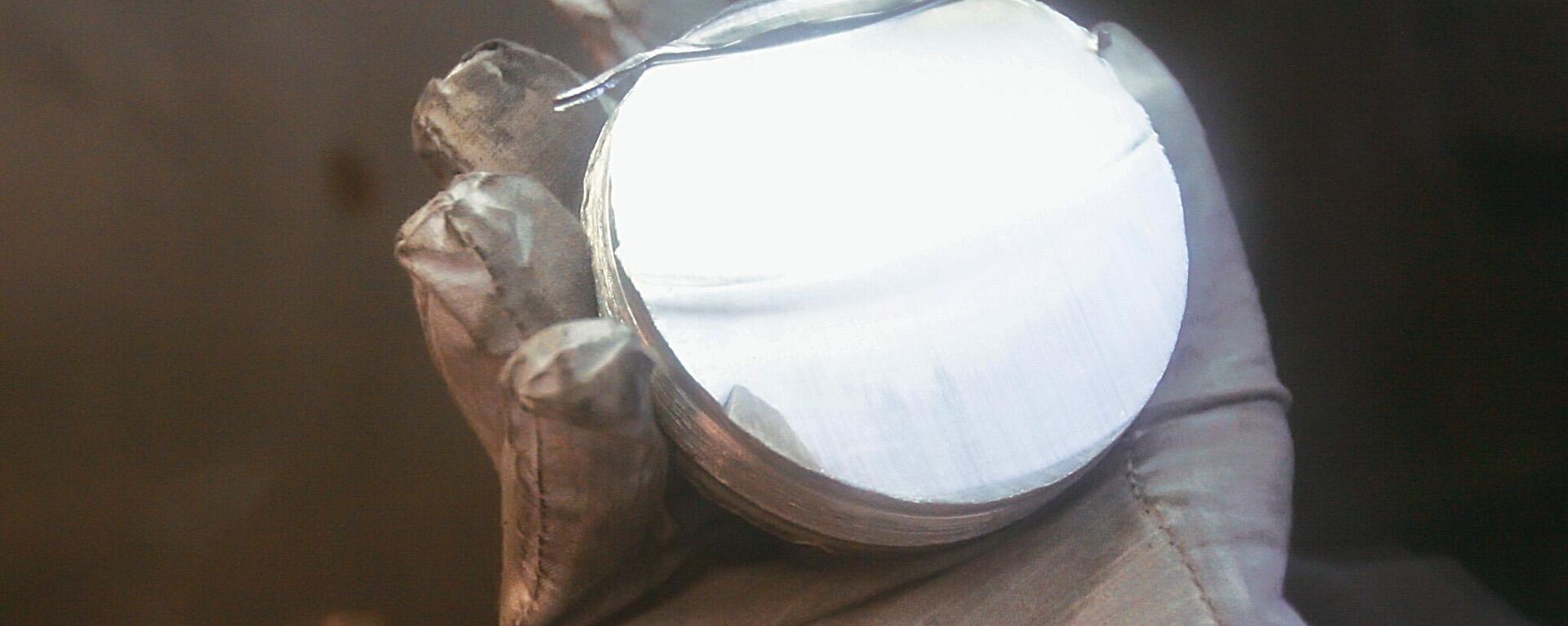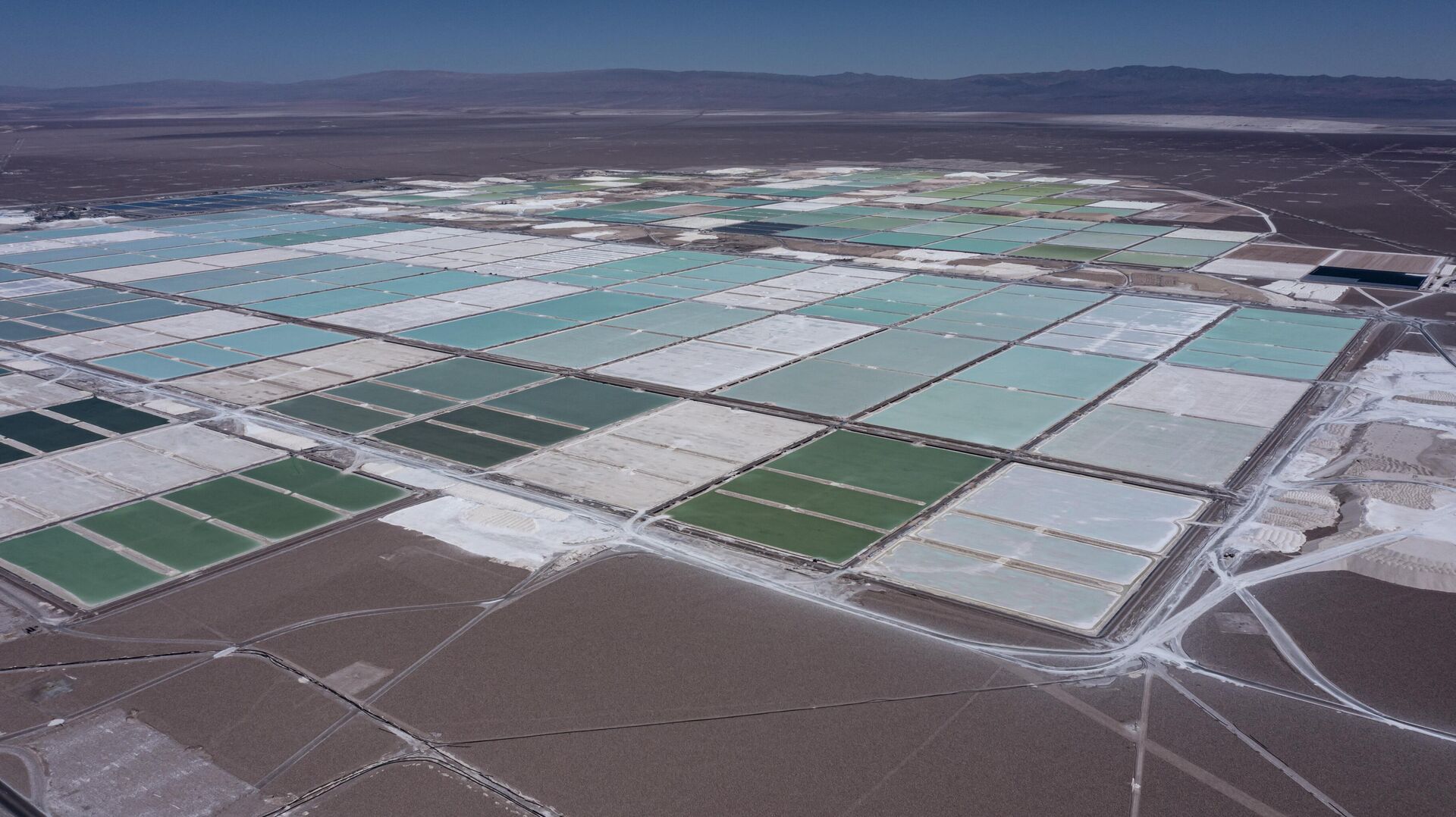https://sputnikglobe.com/20230429/chiles-new-lithium-strategy-will-recoup-much-needed-earnings-for-public-purse-1109954191.html
Chile’s New Lithium Strategy Will ‘Recoup’ Much-Needed Earnings for ‘Public Purse’
Chile’s New Lithium Strategy Will ‘Recoup’ Much-Needed Earnings for ‘Public Purse’
Sputnik International
The Chilean government’s new plan for its lithium production is about recouping some of the earnings of private companies for the public purse, Ollie Vargas, writer and journalist with Kawsachun News said.
2023-04-29T15:12+0000
2023-04-29T15:12+0000
2023-04-29T18:14+0000
analysis
chile
lithium
lithium ion battery
latin america
https://cdn1.img.sputnikglobe.com/img/07e7/04/1d/1109955529_0:264:2702:1784_1920x0_80_0_0_c11b9158ce77333b5abcd496bdb95689.jpg
The Chilean government’s new plan for its lithium production is not about nationalizing the industry, but about recouping some of the earnings of private companies for the public purse, Ollie Vargas, writer and journalist with Kawsachun News, told Sputnik.Vargas described what was being mulled by one of the world's top producers of lithium - a public-private partnership - as similar to what was being carried out in other countries, like Argentina. "I wouldn't call it a full nationalization. And also, it doesn't nationalize the lithium extraction that's going on currently," he said.Amid the booming demand for lithium – a key element in the production of electric batteries and other green transition products – Chile is set to wrest back more government control over the industry. Recently, the president of Chile announced a program that would call for private partners in different endeavors in this sphere, but allowing for the government of Chile, in all of these public private endeavors, to control a majority of shares."Existing contracts would be honored. There's not going to be any expropriation of existing projects", Chile’s President Gabriel Boric said, adding that new ones will have to be structured, with the government having the final say. There was also mention of adhering to stricter environmental protection rules and ensuring that local residents, mostly indigenous, profit from the extraction.Albeit a limited one, it is certainly a positive reform for the country, added the journalist.Of course, the Chilean plan presupposed a very different model to those implemented, for example, in Mexico and Bolivia, where “all of the lithium reserves are in the hands of the state, in the hands of the public,” where there are partnerships with private companies, but “with a majority controlled by the state,” the writer added. He noted that Mexico has been generating headlines for at least a year now, as under President Andres Manuel Lopez Obrador, the country has been trying to take more control over refining some of the products that it sells, like oil.Bolivia is now much further along the route of industrializing and refining lithium, the writer added. For that, it has been lambasted by Western mainstream press, like The New York Times, especially for a decision to partner with a Chinese company that would bring investment into the development of batteries and car batteries there, Ollie Vargas said.While Bolivia and Mexico can be expected to become the target of ramped-up criticism and scaremongering for taking the route of nationalization, Chile’s moderate model will seem more "tolerable" for the US, Vargas said.As for talk of a possible “lithium cartel” between some of the lithium producers, like Argentina, Chile, Bolivia, and Brazil, with the price set by them, it would be difficult, Vargas underscored.For more fascinating commentary on the issue, check out our Sputnik radio show Political Misfits.
https://sputnikglobe.com/20230130/scholz-claims-special-interest-in-chilean-lithium-1106805998.html
chile
Sputnik International
feedback@sputniknews.com
+74956456601
MIA „Rosiya Segodnya“
2023
News
en_EN
Sputnik International
feedback@sputniknews.com
+74956456601
MIA „Rosiya Segodnya“
Sputnik International
feedback@sputniknews.com
+74956456601
MIA „Rosiya Segodnya“
chile, lithium, lithium production, recouping earnings of private companies, ollie vargas, writer and journalist, kawsachun news, public-private partnership, exert more control over lithium industry.
chile, lithium, lithium production, recouping earnings of private companies, ollie vargas, writer and journalist, kawsachun news, public-private partnership, exert more control over lithium industry.
Chile’s New Lithium Strategy Will ‘Recoup’ Much-Needed Earnings for ‘Public Purse’
15:12 GMT 29.04.2023 (Updated: 18:14 GMT 29.04.2023) Plans announced by Chilean President Gabriel Boric are part of the drive for more expansive nationalization of lithium production, witnessed in countries like Bolivia and Mexico, albeit on a more modest scale at the moment, Ollie Vargas, writer and journalist, said.
The Chilean government’s new plan for its lithium production is
not about nationalizing the industry, but about
recouping some of the earnings of private companies for the public purse, Ollie Vargas, writer and journalist with Kawsachun News,
told Sputnik.
Vargas described what was being mulled by one of the world's top producers of lithium - a public-private partnership - as similar to what was being carried out in other countries, like Argentina. "I wouldn't call it a full nationalization. And also, it doesn't nationalize the lithium extraction that's going on currently," he said.
Amid the
booming demand for lithium – a key element in the production of electric batteries and other green transition products – Chile is set
to wrest back more government control over the industry. Recently, the president of Chile announced a program that would call for private partners in different endeavors in this sphere, but allowing for the government of Chile, in all of these public private endeavors, to control a majority of shares.
"Existing contracts would be honored. There's not going to be any expropriation of existing projects", Chile’s President Gabriel Boric said, adding that new ones will have to be structured, with the government having the final say. There was also mention of adhering to stricter environmental protection rules and ensuring that local residents, mostly indigenous, profit from the extraction.
“What this bill is about is, essentially, creating a public-private partnership for future extraction, but it says very little about industrialization. And which is, you know, do you want to be exporting lithium in its rural form as essentially salt, or do you want to be producing batteries and, you know, other value added products in facilities that are owned by the state in which profits can come into the state? That's not what's happening in Chile,” Ollie Vargas said.
Albeit a limited one, it is certainly a positive reform for the country, added the journalist.
“It's an improvement on what they have at the moment, where Chile's earning very little, almost nothing from lithium extraction, very low prices in the hands of private companies. This will recoup some of that," he added.
Of course, the Chilean plan presupposed a very different model to those implemented, for example, in Mexico and Bolivia, where “all of the lithium reserves are in the hands of the state, in the hands of the public,” where there are partnerships with private companies, but “with a majority controlled by the state,” the writer added. He noted that Mexico has been generating headlines for at least a year now, as under President Andres Manuel Lopez Obrador, the country has been trying to take more control over refining some of the products that it sells, like oil.
Bolivia is now much further along the route of industrializing and refining lithium, the writer added. For that, it has been lambasted by Western mainstream press, like The New York Times, especially for a decision to partner with a Chinese company that would bring investment into the development of batteries and car batteries there, Ollie Vargas said.
While Bolivia and Mexico can be expected to become the target of ramped-up criticism and scaremongering for taking the route of nationalization, Chile’s moderate model will seem more "tolerable" for the US, Vargas said.
“The State Department serves to promote Chile and President Boric as a kind of face of the acceptable moderate left, the democratic left, as opposed to the ‘authoritarian’ and, you know, ‘nationalist’ left of Venezuela, Cuba, Bolivia, and even I think probably in a couple of years where they'll be adding Brazil to that list as well,” he said.

30 January 2023, 04:39 GMT
As for talk of a possible “lithium cartel” between some of the lithium producers, like Argentina, Chile, Bolivia, and Brazil, with the price set by them, it would be difficult, Vargas underscored.
“I don't believe Chile are on the same page as Bolivia and Mexico in this. And Chile are not going to be producing industrialized finished goods in the way that Bolivia, Mexico are going to be doing,” Ollie Vargas concluded.
For more fascinating commentary on the issue, check out our Sputnik radio show Political Misfits. 





